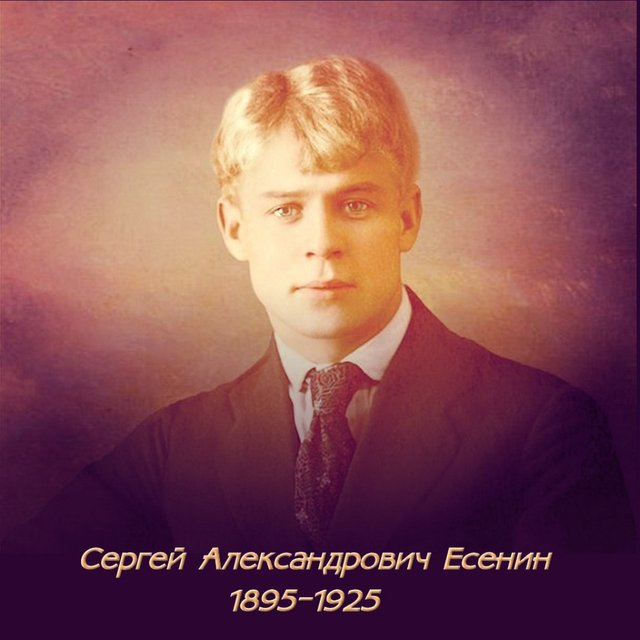The poet who glorified Russia. Sergey Esenin

If Sergei Yesenin was alive, he would have been 123 years old in October and 93 years old on December 28. But these venerable figures are difficult to connect with the name of the poet. In hearts readers Yesenin remains forever young, as forever fresh and young his best poems and poem.
This man's life coincided with a turbulent period of Russian history - the era of the three wars and two revolutions. These Grand events have left their mark on his work and his life.
Sergei Yesenin was born in the family of a peasant in the village of Konstantinovo, Ryazan province. He grew up and was brought up in a family of village rich grandparents and grandfather - religious people who knew a lot of fairy tales and gave shelter to the wandering blind, singing to the accompaniment of kobza spiritual and other songs. These tales and songs prompted the boy's desire to write his own poems, and he wrote them, imitating folk poetry.
Yesenin himself wrote: "I began to write Poetry early, at the age of nine, but I relate conscious creativity to 16-17 years."
The family wanted Sergei to be a teacher and sent him to a closed teacher's school. After graduating, the future poet spent a year in the village, and then went to Moscow and entered the people's University of Shanyavsky. 19-year-old boy Yesenin came to St. Petersburg, where he met with one of the largest Russian poets - Alexander Blok and showed him his poems. They made a great impression on Blok, and he noted that they were " fresh, clean, vociferous." Other poets of the time also recognized his fresh talent and introduced the young poet into his literary circle. Since then, the best magazines print Yesenin's poems, and in the autumn of 1915 his first book "Radunitsa"appears.
The revolution took Yesenin at the front, in one of the disciplinary battalions, where according to him, he got over the fact that he refused to write a poem in honor of the king. The poet also did not serve the provisional government and deserted from Kerensky's army.
In 1919 - 1920 and 21, Yesenin travels a lot in Russia, visits Solovki, Arkhangelsk,
Kyrgyzstan, Turkestan, Ukraine, Crimea and Caucasus. After that, in 1922, he flies an airplane to Koenigsberg, travels across Europe, travels overseas-to America.
"I am pleased most of all that I returned to Soviet Russia" - Yesenin wrote later in his biography. In the country of business on the observations of the poet, " lost not only art, but in General the best impulses of mankind."
Overseas trip further exacerbated Yesenin a sense of home, her new path, her mighty forces. It is no accident in the mouth of Commissioner Rassvetov, the hero of the dramatic poem "Nomah", the poet put the words:
The more I look at the snow expanse,
Those think all harder.
Damn it!
But our Siberia
Richer than yellow California.
With these ore reserves
We are not afraid of any
World blockade.
Just work! Just work!
And the Republic will be,
That whom need to.
In the works of Yesenin really reflected all his quest and all his innermost thoughts and moods:
And suffer that I do not understand,
Where the fate of events takes us.
To understand revolution and not to lag behind it, to make for the people as much as possible useful was passionate desire of the poet because he loved the homeland devoted FILIAL love.
Oh, Russia, raspberry field,
Oh, blue fallen into the river,
Love to pleasure and pain
Your lake Blues.
The idea of the Motherland is the main thing in Yesenin's poetry. "Do you want good advice? - he asked one of his friends. - Look home!.. There is no poet without Motherland".
But then, when the whole planet
Will the hostility of tribes will disappear lies and sadness.
I will sing with all my being in the poet
The sixth part of the earth with the name short "Russia".
"Reaching out to the people," "love people" - this noble feeling warmed by the many poems. This quality was noticed by M. M. Gorky. During his travels abroad Sergey Yesenin and Alexey Maksimovich met in Berlin
and after reading him an excerpt from the dramatic poem "Pugachev", touched the great writer to tears. Gorky asked Yesenin to read another "Song about the dog", and the poet read it as perfectly as he knew how to do it rarely anyone else.
"After these verses, recalled the good home - I could not help thinking that Yesenin not as many people as the authority, created by nature exclusively for poetry, to Express the inexhaustible "fields of sorrow", love for all living things in the world and
mercy, which - more than anything else-is deserved by man."
The memory of Sergei Yesenin and his poems are destined to live...
I love his work
и я люблю его стихи. Особенно лирические
я несколько на память знаю. Из серии Москва-кабацкая
Московский озорной гуляка, особенно